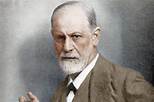DREAM DICTIONARY
Made Of Dreams
Search
Dreams Have a Meaning - 4 - Dream Psychology









Dreams Have a Meaning - 4 - Dream Psychology
I shall take every care to avoid a confusion between the manifest and the latent content, for 1 ascribe all the contradictory as well as the incorrect accounts of dream-life to the ignorance of this latent content, now first laid bare through analysis.I shall take every care to avoid a confusion between the manifest and the latent content, for 1 ascribe all the contradictory as well as the incorrect accounts of dream-life to the ignorance of this latent content, now first laid bare through analysis. The conversation of the latent dream thoughts into those manifest deserves our close study as the first known example of the transformation of psychical stuff from one mode of expression into another.
From a mode of expression which, moreover, is readily intelligible into another which we can only penetrate by effort and with guidance, although this new mode must be equally reckoned as an effort of our own psychical activity.From the standpoint of the relationship of latent to manifest dream-content, dreams can be divided into three classes. we can, in first place, distinguish those dreams which ahve a meaning and are, at the same time, intelligible, which allow us to penetrate into our psychical life without further ado. Such dreams are numerous; they are usually short, and, as a general rule, do not seem very noticeable, because everything remarkable or exciting surprise is absent.
This occurence is, moreover, a strong argument against the doctrine which derives the dream from the isolated activity of certain cortical elements. all signs of a lowered or subdivided psychical activity are wanting. Yet we never raise any objection to characterizing them as dreams, nor do we confound them with the products of our waking life.This occurence is, moreover, a strong argument against the doctrine which derives the dream from the isolated activity of certain cortical elements. all signs of a lowered or subdivided psychical activity are wanting. Yet we never raise any objection to characterizing them as dreams, nor do we confound them with the products of our waking life.
A second group is formed by those dreams which are indeed self-coherent and have a distinct meaning, but appear strange because we are unable to reconcile their meaning with our mental life. That is the case when we dream, for instance, that some dear relative has died of plague when we know of no ground for expecting, apprehending, or assuming anything of the sort; we can only ask ourself wonderingly; "What brought that into my head?" To the third group those dreams belong which are void of both meaning and intelligibility; they are incoherent, complicated, and meaningless.
The overwhelming number of our dreams partake of this character, and this has given rise to the contemptuous attitude towards dreams and the medical theory of their limited psychical activity. It is especially in the longer and more complicated dream-plots that signs of incoherence are seldom missing.The overwhelming number of our dreams partake of this character, and this has given rise to the contemptuous attitude towards dreams and the medical theory of their limited psychical activity. It is especially in the longer and more complicated dream-plots that signs of incoherence are seldom missing.
The contrast between manifest and latent dream-content is clearly only of value for the dreams of the second and more especially for those of the third class. here are p[roblems which are only solved when the manifest dream is replaced by its latent content; it was an example of this kind, a complicated and unintelligible dream, thet we subjected to analysis.Against our espectation we, however, struck upon reasons which prevented a complete cognizance of the latent dream thought.The contrast between manifest and latent dream-content is clearly only of value for the dreams of the second and more especially for those of the third class, here are problems which are only solved when the manifest dream is replaced by its latent content; it was an example of this kind, a complicated and unintelligible dream, thet we subjected to analysis. Against our expectation we, however, struck upon reasons which prevented a complete cognizance of the latent dream thought.
On the repetition of this same experience we were forced to the supposition that there is an intimate bond, with laws of its own, between the unintelligible and complicated nature of the dream and the difficulties attending communication of the thoughts connected with the dream, Before investigating the nature of this bond, it will be advantageous to turn our attention to the more readily intelligible dreams of the first class where, the manifest and latent content being identical, the dream work seems to be omitted.
The invesigation of these dreams is also advisable from another stand point. The dreams of children are of this nature; they have a meaning, and are not bizarre, This, by the way, is a further objection to reducing dreams to a dissociation of cerebral activity in sleep, for why should such a lowering of psychical functions belong to the nature of sleep in adults, but not in children? We are, however, fully justified in expecting that the explanation of psychical processes in children, essentially simplified as they may be, should srve as an indispensable preparation towards the psychology of the adult.
I shall therefore cite some examples of dreams which I have gathered from children. A girl of nineteen months was made to go without food for a day because she had been sick in the morning, and, according to the nurse, had made herself sick through eating strawberries. During the night, after her day of fasting, she was heard calling out her name during sleep, and adding;"tawberry, eggs, pap." She is dreaming that she is eating, and selects out of her menu exactly what she supposes she will not get much of just now.
Reference: Dream Psychology - Sigmund Freud


